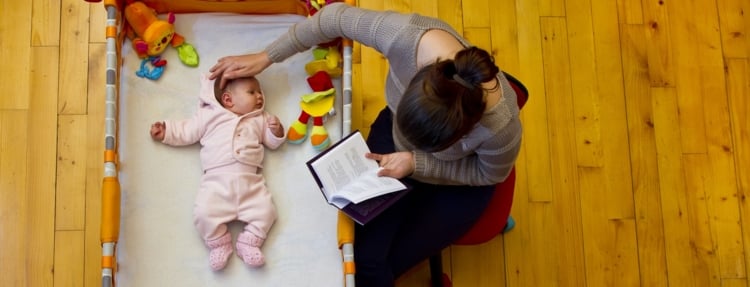-
Tracking cycle
-
Getting pregnant
-
Pregnancy
-
Help Center
-
Flo for Partners
-
Anonymous Mode
-
Flo app reviews
-
Flo Premium New
-
Secret Chats New
-
Symptom Checker New
-
Your cycle
-
Health 360°
-
Getting pregnant
-
Pregnancy
-
Being a mom
-
LGBTQ+
-
Quizzes
-
Ovulation calculator
-
hCG calculator
-
Pregnancy test calculator
-
Menstrual cycle calculator
-
Period calculator
-
Implantation calculator
-
Pregnancy weeks to months calculator
-
Pregnancy due date calculator
-
IVF and FET due date calculator
-
Due date calculator by ultrasound
-
Medical Affairs
-
Science & Research
-
Pass It On Project New
-
Privacy Portal
-
Press Center
-
Flo Accuracy
-
Careers
-
Contact Us
Reading to Newborns: When to Start Reading to Your Baby


Every piece of content at Flo Health adheres to the highest editorial standards for language, style, and medical accuracy. To learn what we do to deliver the best health and lifestyle insights to you, check out our content review principles.
Why is reading good for babies?
When you read to your baby, you create a connection with your child and build their language, social, emotional, and literacy skills.
Don’t worry about comprehension. Your baby will not understand the story or what you are saying. It is more about the gestures. When you are teaching your baby about an object, point to the object in the book so that they can see what you are talking about.
Turning the pages of a storybook also catches your baby’s attention. When you act out what you’re reading using noises and hand gestures, it is bound to instill some interest in the activity.
Once you turn this into a daily routine, you’ll be surprised by how quickly your baby will start learning and understanding small things. Repetition is key.
You’ll probably read the same storybook or sing the same song every day during reading time. It may be tedious and boring after a while, but it will help shape your child’s daily routine, which will pay off later as they get older.
When should you start reading to your baby?
It’s entirely up to you when to start reading to your baby. Some parents read to their babies when they are still in the womb. Others wait until the baby is a few months old to start reading to them.
However, experts say that the earlier you start reading to your baby, the better. In fact, they recommend that you introduce your child to reading as early as you introduce them to toys.
Flo helps me so much when I’m on my period. The thing I like the most is that you can talk with the community anonymously and share your own stories. You can see other people stories and interact with people like you.
How to read to your baby: important tips
- Observe your baby’s face. Watch your child’s face as you read to them. This can help you determine what they are really interested in. Your child may not communicate verbally, but they may give you some nonverbal cues as to what they like.
- Ensure your baby is comfortable. Make sure your child is in a comfortable position before you start your reading session. Most parents prefer to hold their children in their lap as they read to them. This creates more intimate reading.
- Make it interesting. Keep your child interested in the book by allowing them to touch it and turn the pages. Let your child play with the book. By doing so, your child may see the book as something more interesting than an object to look at.
- Make reading a daily ritual. Read to your child at least once a day to get them interested in books and reading.
- Exercise patience. Be patient and only stop reading when your baby falls asleep or when they want to stop.
- Be creative. Substitute your child’s name for the main character. Use sounds, tones, and gestures when acting out each character’s emotions. You may also use toys to act out the story.
- Use appropriate material. Use age-appropriate colorful storybooks, songbooks, lullabies, and board books when reading to your child.
Take a quiz
Find out what you can do with our Health Assistant

Most children love fairy tales because they can escape into a different world. But are fairy tales good for children? Some experts believe that fairy tales can have a negative impact on a child’s psychology in terms of self-image.
Some studies have reported that girls who read fairy tales a lot have negative self-image compared to others. This could be because of the manner in which princesses are depicted.
Princesses are often described as slim and beautiful with long flowing hair. They are often waiting for a handsome prince to rescue them. Some experts and parents believe that these fairy tale characters convey a negative message to children about women’s physical appearance.
When children believe that girls need to be slim and beautiful and that their main goal should be to attract a “prince,” this can lead to an unhealthy perception of women’s value.
Moreover, fairy tale princesses always appear helpless until they are rescued by a hunky prince. This can also send the wrong message about romantic relationships. Women aren’t helpless creatures who need rescuing.
Fairy tales aside, here are some reasons why reading stories is important:
- They boost a child’s imagination.
- They increase cultural literacy in children.
- They teach children how to deal with emotions and difficult situations.
- They teach children how to deal with different social situations.
- They boost creative thinking.
- They teach children right from wrong.
You need to have considerable patience if you want to help build your child’s literacy skills. When you turn reading into a daily routine, you will instill in your child a love for books. You are not just teaching your child how to read, you are teaching them to enjoy reading.


Hey, I'm Anique
I started using Flo app to track my period and ovulation because we wanted to have a baby.


The Flo app helped me learn about my body and spot ovulation signs during our conception journey.


I vividly
remember the day
that we switched
Flo into
Pregnancy Mode — it was
such a special
moment.
Real stories, real results
Learn how the Flo app became an amazing cheerleader for us on our conception journey.




